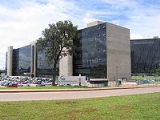
Superior Labor Court
Encyclopedia

The Superior Labor Court or Tribunal Superior do Trabalho (TST), in Portuguese, is the highest Brazilian appellate court for Labor law issues. Its headquarters are located in Brasilia
Brasília
Brasília is the capital city of Brazil. The name is commonly spelled Brasilia in English. The city and its District are located in the Central-West region of the country, along a plateau known as Planalto Central. It has a population of about 2,557,000 as of the 2008 IBGE estimate, making it the...
, near the American Embassy.
It is one of the five high courts in Brazil.
It is the highest instance in the Brazilian federalized labor courts system, which includes the Regional Labor Courts (Tribunais Regionais do Trabalho - TRT's), at common appeal level, and the Trial Labor Courts (Varas do Trabalho) in the first instance level.
History
The origins of that court remonts the National Labor Council, created in 1923, which was a part of the Federal Executive Branch, subordinated to the Ministry of Agriculture, Industry and Comerce.In 1946 the Council was transformed in the Tribunal Superior do Trabalho. The Brazilian Constitution adopted in that same year recognized the TST as part of the Judiciary Branch, no longer subordinated to the Executive Branch. That basic situation was kept by all subsequent Constitutions.
Since its origins, that Court was integrate by both effective Ministers and temporary class Ministers. The effective Ministers (nicknamed "togados" after the distinctive robes
Robes
Robes is an electronic indie new wave synth band from Carrboro, North Carolina. Members include Patrick Cudahy and Chris Williams. They've been in various bands over the last decade or so with lots of funny names: Joby's Opinon, Jacuzzi Brothers, Smooth Hedges, The Soft Drink. Sound reference...
- "togas" - which they wear) were considered Magistrates for all legal prerogatives, while the Temporary Classist Ministers ("classistas"), which were paritary representatives of both patrons em employers ("classes"), were pointed for a fixed term (usually 3 years) and had fewer powers and prerogative. The Classists Ministers were abolished by a constitutional amendment
Constitutional amendment
A constitutional amendment is a formal change to the text of the written constitution of a nation or state.Most constitutions require that amendments cannot be enacted unless they have passed a special procedure that is more stringent than that required of ordinary legislation...
in 1999, subsisting only the effective Ministers.
Composition
By the actual legislation, the Court is integrated by 27 members, entitled Ministers (Ministros), pointed by the President of BrazilPresident of Brazil
The president of Brazil is both the head of state and head of government of the Federative Republic of Brazil. The president leads the executive branch of the federal government and is the commander-in-chief of the Brazilian Armed Forces...
. The nomination only occurs after the approval of the Senate
Senate of Brazil
The Federal Senate of Brazil is the upper house of the National Congress of Brazil. Created by the first Constitution of the Brazilian Empire in 1824, it was inspired by the United Kingdom's House of Lords, but with the Proclamation of the Republic in 1889 it became closer to the United States...
. All the nominated members must be at least 35 and no more than 65 years old, must have Brazilian nationality and moral integrity, plus all the requirements to enter in a public service carrier (e.g. regularity with conscription and electoral duties).
There are 3 positions reserved lawyers, indicated by the Order of Attorneys of Brazil
Order of Attorneys of Brazil
The Order of Attorneys of Brazil is the Brazilian Bar association, founded in 1930. It is an organization of lawyers and responsible for the regulation of the legal profession in the country. Its national headquarters are in Brasília, Federal District...
(the official Bar association), 3 for members of the Public Ministry
Public Ministry (Brazil)
The Public Ministry is the Brazilian body of independent public prosecutors, working both at the federal and state level. It operates independently from the three branches of government, and was referred to by Constitutional scholar Michel Temer as the "Fourth Branch".There are three levels of...
, and the remaining 21 for carrier judges of the Regional Labor Courts.
See also
- Brazil federal courts

